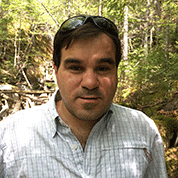Terence D. Capellini is the Chair of the Department of Human Evolutionary Biology at Harvard University. He has a long track record in human evolutionary studies, conducting research that bridges the classic discipline of paleoanthropology with the modern fields of developmental biology, functional genomics, and genetics. His research studies phenomena observable at the microscopic level, such as the way genes are controlled to produce observable visible variation in bone and cartilage cells, to those at the macroscopic level, including how such variation generates the morphological diversity observed in human and nonhuman primate skeletons. His lab is currently undertaking a number of projects, such as the way genes are controlled to shape different bones of the skeleton, the nature in which interbreeding with Neanderthals has lead to human adaptations, and the manner in which human evolution has influenced our genetic code to increase our risk of osteoarthritis.
Terence received his undergraduate degree at the State University of New York at Binghamton in 1995, where he studied physics and human evolution. After receiving his Masters degree at Kent State University in the field of Biological Anthropology in 1998, he joined the City University of New York and the New York Consortium of Primatology in 2000 to conduct his MPhil and PhD research. During this time he worked on Neanderthal archaeological sites in Southwestern France, and performed gene targeting “knockout” experiments at Cornell Medical Center in Manhattan. His PhD research focused on the roles of major factors in the patterning and development of the skeleton of the limbs and girdles, structures that have markedly evolved over the course of human evolution. In 2008, Terence moved to Stanford University Medical School for his postdoctoral fellowship to explore the developmental genetic and evolutionary mechanisms that underlie how joints, such as the knee and hip, form and evolved in humans. Since 2013, his laboratory at Harvard has focused on the intersection of genetics, genomics, skeletal biology, paleoanthropology, and medicine.
